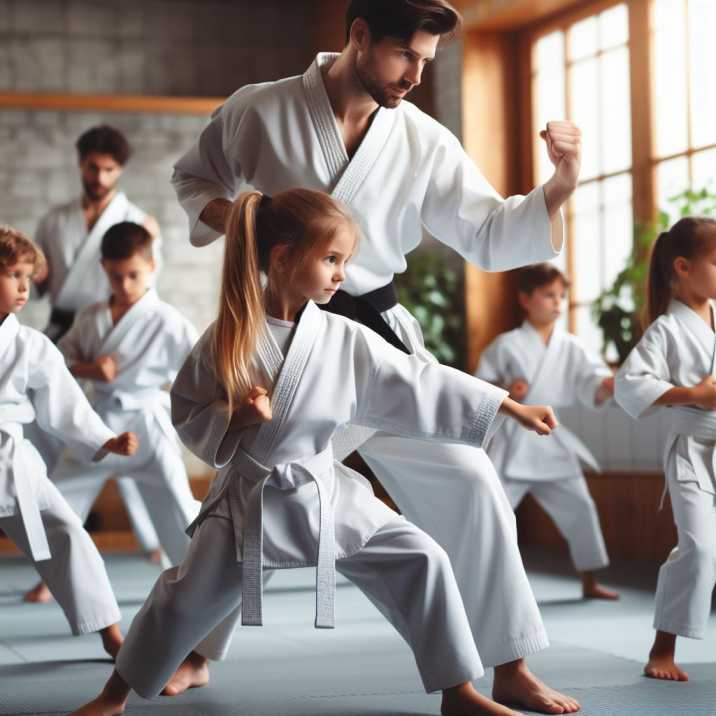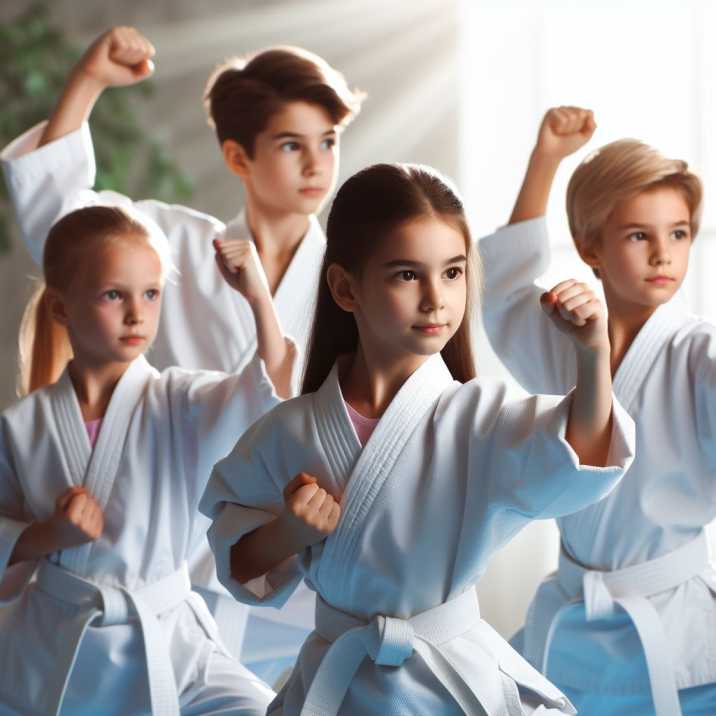Introduction:
Table of Contents
Karate for a child’s behavior
In a world where distractions abound and discipline seems elusive, parents often seek avenues to instill valuable life lessons in their children. One such avenue is the practice of karate, an ancient martial art that extends far beyond physical combat. How exactly does karate for a child’s behavior? Let’s delve into the profound ways in which this disciplined practice can positively influence young minds.

Cultivating Discipline:
At the core of karate lies discipline, a virtue that permeates every aspect of practice. From adhering to strict training schedules to mastering intricate techniques, students learn the importance of commitment and self-control. This discipline extends beyond the dojo, reflecting in children’s behavior at home, school, and beyond.
Fostering Focus and Concentration:
In today’s fast-paced world, cultivating focus is paramount for success. How karate for a child’s behavior, Karate demands unwavering attention to detail, whether executing precise movements or engaging in sparring sessions. Through consistent practice, children sharpen their concentration skills, enhancing their ability to tackle academic challenges and navigate daily tasks with clarity.
Instilling Respect and Courtesy:
Central to karate etiquette is the notion of respect, both for oneself and others. Students bow to their instructors, fellow practitioners, and the dojo itself, fostering a culture of mutual respect and courtesy. This ingrained sense of respect translates into respectful behavior towards peers, authority figures, and the community at large.
Promoting Self-Confidence:
The journey of mastering karate techniques instills a profound sense of accomplishment in children, boosting their self-esteem and confidence. As they progress through belt ranks, overcoming challenges and setbacks along the way, they develop resilience and belief in their abilities. This newfound confidence transcends the dojo, empowering children to tackle life’s obstacles with courage and determination.
Channeling Energy Positively:
Children are bundles of energy, often seeking outlets for their boundless vitality. Karate provides a constructive avenue for channeling this energy, offering rigorous physical activity intertwined with mental focus. By engaging in dynamic movements and controlled breathing, children learn to harness their energy productively, reducing impulsivity and hyperactivity.
Cultivating Patience and Perseverance:
Karate is a journey of continuous learning, where progress is measured not in leaps but in gradual, incremental steps. Children quickly realize that mastery requires patience and perseverance, as they navigate the complexities of kata sequences and refine their techniques over time. This cultivation of patience and resilience prepares them to tackle challenges with a determined spirit, both on and off the dojo floor.
Building Social Skills and Teamwork:
Karate dojos serve as nurturing environments where children forge friendships, collaborate with peers, and learn the value of teamwork. Whether practicing drills together or participating in group demonstrations, students develop crucial social skills such as communication, cooperation, and empathy. These interpersonal skills extend beyond the dojo, enriching children’s relationships in various social settings.

Conclusion:
karate for a child’s behavior, Karate is much more than a martial art; it is a holistic discipline that molds character, instills values, and transforms behavior. Through its rigorous yet rewarding practice, children embark on a journey of self-discovery, growth, and personal development. From discipline and focus to respect and confidence, the lessons learned on the dojo floor transcend into every facet of a child’s life, shaping them into resilient, respectful, and responsible individuals.
FAQs:
- How does karate help improve a child’s behavior? Karate instills discipline, focus, respect, and confidence in children through rigorous practice and adherence to martial arts principles.
- At what age can children start learning karate? Children as young as four years old can start learning karate, although readiness may vary based on individual maturity levels.
- Can karate help with aggression in children? Yes, karate provides a constructive outlet for channeling aggression into disciplined action, teaching children self-control and conflict resolution skills.
- How often should children practice karate? Consistent practice is key to progress in karate. Children typically attend classes 2-3 times per week, supplemented by individual practice at home.
- What are the mental benefits of practicing karate? Karate enhances mental focus, concentration, and self-discipline, promoting overall cognitive development in children.
- How does karate promote respect and courtesy? Karate emphasizes respect for oneself, instructors, peers, and the dojo environment, fostering a culture of mutual respect and courtesy.


